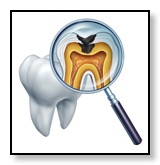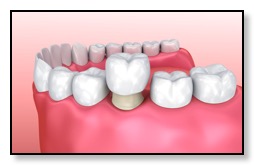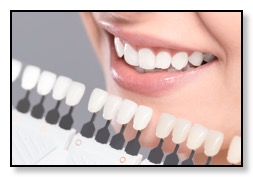Dental Crowns: What are They and Do I Need One?
Common Symptoms of Needing a Dental Crown

» Bite pressure pain/discomfort (when chewing)
» Bruxism - wearing down your natural teeth to the point they hurt
» Root exposure from clenching/grinding
» Fractured teeth - old large fillings usually cause this
» Black or dark area around old or leaking mercury/amalgam fillings
» Reoccurring or recurrent decay around old fillings and old crown margins
» Broken or worn-down tooth causing sensitivity
» Sensitivity to sweet, hot, cold, etc.
While not all these situations warrant a new crown, it is best to have Dr. Tsai evaluate the tooth and root structure as soon as you can. Having a crown placed early can avoid further costly treatment such as Root Canal Therapy and Dental Implants.
What are Dental Crowns?

A crown is cemented in place and fully covers the visible portion of the tooth, encasing it for full protection. Dental crowns are also used to cover Dental Implants or to support a Dental Bridge.
Crowning may be done:
» To cover and protect worn-down teeth
» To protect sensitive teeth
» To support teeth with large fillings
» To protect cracked or weakened teeth from breaking apart
» To restore badly shaped or discolored teeth
» To protect a restored tooth on which root canal has been done
» To hold a dental bridge in place
» To cover a dental implant
How are Dental Crowns Placed?
Once Dr. Tsai decided that you need a dental crown, the first step she will take is to prepare the tooth to receive the crown. She will first numb the area with anesthetic and then work on removing the parts of the tooth causing any issue - decayed, misshaped, or discolored parts, etc. While doing this, she will also shape the tooth, without touching the pulp, so that the crown can be placed firmly on it with proper alignment to adjacent teeth.

When the permanent crown is fabricated, the temporary one is removed and replaced with the permanent crown. Dr. Tsai will make necessary adjustments to ensure that the new crown looks, feels, and functions just like your natural tooth, and when Dr. Tsai and you are satisfied with how it looks and feels, the new crown will be permanently fixed in place with special dental cement. The final step is scraping off and cleaning the excess cement around the tooth.
What are Dental Crowns Made of?
Here at Millbrae Dental Care, the best dental clinic in the San Francisco Bay Area, we generally use all-zirconia crowns. Zirconia is a strong and durable ceramic material, and all-zirconia crowns are even stronger than porcelain crowns with metal base. They also provide a great balance of function and aesthetics. For anterior or front teeth, we usually use a more cosmetic Empress II material which provides translucency or depth effect for a more natural tooth/crown. This makes sure that your smile shows only beautiful, natural-looking teeth to others.
Pros and Cons of Dental Crowns
» Well-made crowns are nearly impossible to distinguish from your natural teeth
» Crowns can last a long time, 5-20 years is typical
» Their permanent bonding makes them easy to care for like a natural tooth
» Crowning can be used to solve a wide range of teeth problems
» Some crowns can chip or become loose over time and need to be replaced
» When your gums recede you will see a metal/dark line at the top of your tooth
» The tooth under a crown may still be affected by reoccurring decay or damage
Caring for Dental Crowns

Since crowns are permanently fixed on the teeth, you can take care of them like you would your natural teeth. You should brush your teeth twice a day and floss at least once a day to keep your teeth and gums healthy and clean. You should also strictly follow the twice-yearly professional cleaning routine universally recommended.
How Much do Dental Crowns Cost?
As useful and beneficial as they are, dental crowns may not be the only answer to all teeth problems. If you have any of the symptoms mentioned above, or if you think you need a crown, dental implant, dental bridge or any other treatment, schedule an appointment with Dr. Tsai or give us a call.
Have questions about dental crowns? email or call us: (650)-583-5880
📩
Send us Email
📅
Request Appointment
* These are suggested ranges of crowns, bridge units, etc. They are not actual prices are not quotes of our prices. Prices vary with tooth number, location, color, additional procedures needed, aesthetic qualities, etc. Please ask our office for a clinical evaluation and a financial estimate for your situation.